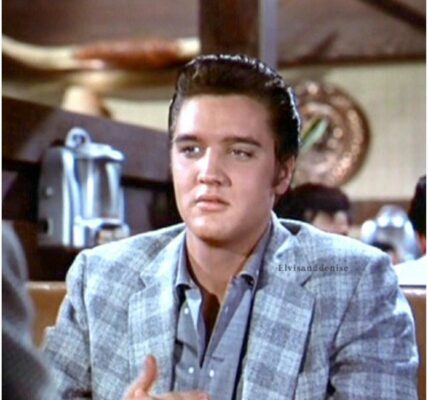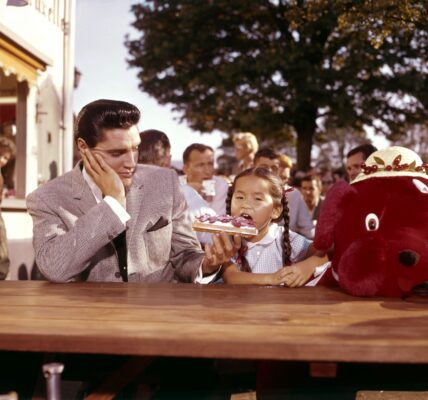Elvis Presley’s ‘How’s the World Treating You’: A Soulful and Reflective Ballad from His 1956 Album. N
“How’s the World Treating You” is a gentle, introspective ballad by Elvis Presley, featured on his 1956 album Elvis. Unlike the energetic and fiery rock ‘n’ roll songs that many associate with Presley, this track stands out for its quiet emotional depth and sincerity, showcasing his ability to deliver heartfelt performances across various musical styles.

The song’s lyrics revolve around the poignant question posed by someone reflecting on a past relationship, wondering how their former lover is faring in life after their separation. It expresses feelings of sadness and loss, capturing the lingering pain and wistfulness that often accompany the end of a romance. The universal theme of longing and regret resonates with listeners, making it easy for anyone who has experienced heartache to connect with the song.

In “How’s the World Treating You,” Elvis’s voice is soft and full of emotion, contrasting sharply with the more upbeat, vibrant numbers for which he is often known. He doesn’t rely on complex vocal techniques or grandiose performances here; instead, his smooth delivery conveys the vulnerability and sorrow in the song’s message. This demonstrates his versatility as an artist, proving that he could excel in both lively, passionate rock songs and tender, introspective ballads.
Musically, the song is simple yet elegant, with minimal instrumentation that allows Elvis’s vocals to take center stage. The gentle strumming of the guitar and the slow, measured tempo create a serene and melancholic atmosphere, enhancing the emotional weight of the lyrics. This stripped-back arrangement complements the reflective tone of the song, making it feel more intimate and personal.
Overall, “How’s the World Treating You” is a testament to Elvis Presley’s ability to convey raw emotion through his music. While it may not have the bombast of his more famous hits, its quiet power lies in its simplicity and sincerity. The song highlights a more contemplative side of the “King of Rock ‘n’ Roll,” demonstrating his skill in delivering ballads that speak to the heart and leave a lasting impression on the listener.
Elvis Aaron Presley, often referred to as the “King of Rock and Roll,” was born on January 8, 1935, in Tupelo, Mississippi, USA. He rose to prominence in the mid-1950s, becoming one of the most iconic and influential figures in the history of popular music. Presley’s musical journey began at an early age when he started singing in church and listening to various genres of music, including gospel, blues, and country. In 1954, he signed a recording contract with Sun Records, where he began his career blending elements of rockabilly, rhythm and blues, and country music. His breakthrough came with the release of his first single, “That’s All Right,” followed by a string of hits such as “Heartbreak Hotel,” “Hound Dog,” and “Jailhouse Rock.” With his charismatic stage presence, distinctive voice, and provocative dance moves, Presley captured the hearts of audiences worldwide, revolutionizing the music industry and popular culture. Presley’s impact extended beyond music; he also found success as an actor, starring in a series of films throughout the 1960s. Despite his commercial success, he faced criticism from some quarters for his crossover into mainstream entertainment and the perceived dilution of his musical authenticity. Throughout his career, Presley struggled with the pressures of fame, leading to personal challenges, including substance abuse and health issues. Despite these obstacles, he remained a beloved figure, revered for his contributions to music and his enduring legacy. Tragically, Elvis Presley passed away on August 16, 1977, at the age of 42, leaving behind a legacy that continues to resonate with generations of fans. He was posthumously inducted into the Rock and Roll Hall of Fame, and his music remains a timeless testament to his enduring talent and cultural impact.




